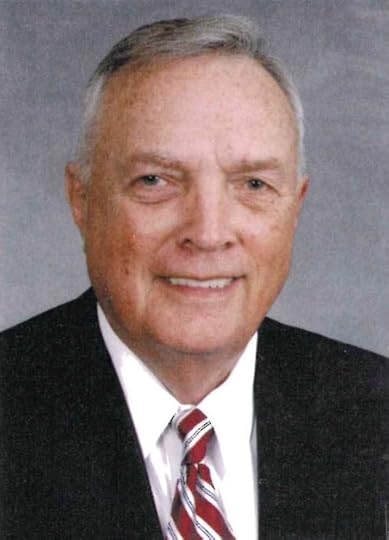Kenneth Atchity's Blog, page 7
March 31, 2025
NEW FROM STORY MERCHANT BOOKS! Mr. Irrelevant Presents Irrelevants Who Rocked the World!
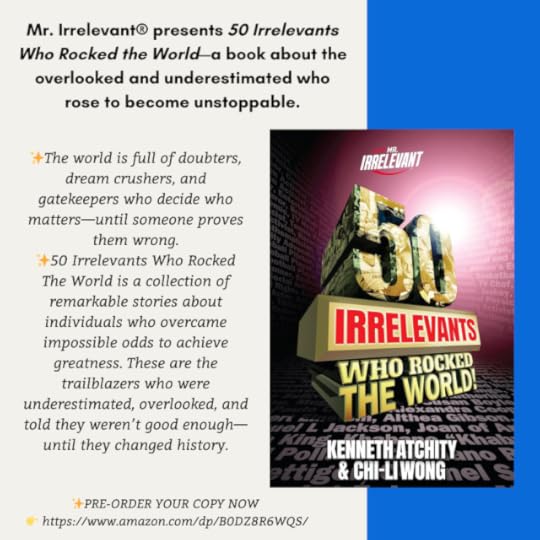
📖 Meet some of the 'Irrelevants' who refused to stay in the shadows:
✔ Brock Purdy—The last pick in the NFL Draft who led the 49ers to a Super Bowl.
✔ Taylor Swift—Once dismissed by the industry, now one of the most influential artists of all time.
✔ Michael Jordan—Cut from his high school basketball team, now a global icon.
✔ Bethany Hamilton—The one-armed surfer who defied all expectations.
✔ Colonel Sanders—A broke and rejected entrepreneur at 65 before building a billion-dollar empire.
✔ J.K. Rowling—A single mother on welfare before becoming the world’s best-selling author.
✔ Susan Boyle—Laughed at before she even sang, yet stunned the world with her voice.
✔ Joan of Arc—A teenage peasant girl who led an army and changed the fate of a nation.
✔ Cat Cora—The first female Iron Chef, who shattered glass ceilings in a male-dominated industry.
For every person who has been underestimated, ignored, or made to feel like they don’t belong—this book is for you. It’s proof that success isn’t reserved for the privileged or the chosen few. It belongs to those who refuse to quit.
If you’ve ever doubted yourself, felt out of place, or needed a reminder that greatness is possible, 50 Irrelevants Who Rocked The World will inspire you to step forward, take your shot, and prove the world wrong.
📖 Read this book and rediscover the fire inside you.
🔥 If you love books like Grit, Can’t Hurt Me, and The Obstacle Is the Way, this is your next must-read.
🔹 Perfect for readers who enjoy motivational success stories, biographies, and self-improvement books.
📢 Dare to be relevant. Dare to rewrite your story.
👉 Get your copy of 50 Irrelevants Who Rocked The World today!
March 28, 2025
Stealing Time for Your Dream in 2025 - Part 4: Where Does the Time Go?

Where does the time go?
The nonproductive dreamer: "I don’t know where the timegoes.
Once your Mind’s Eye takes over: "It doesn’t goanywhere; time’s in your face all the time! It’s knowing what to do with itthat counts."
For me, keeping track of time started at Rockhurst HighSchool in Kansas City, where the Jesuits taught us to schedule our activitiesin precise Accountant segments. A page from the daily list I kept for fouryears looked like a space-launch checklist. Every single ten-minute period allday was chockfull of activities, starting from the moment of awakening to thelast minutes of making the next day’s list.
At the end of each daily agenda, which was written inpencil, was "tomorrow's to do list": At 10:50 P.M. I allowed myselfeight minutes to work on the next day’s agenda. All day I’d been jotting downnotes in pencil to remind me of things that had to be scheduled for the nextday. During the eight minutes at the end of the day, I created the agenda fornext day. All but one of the individual items on the daily agenda are items of"micro management" (defined as what to do on the Accountant's clockwhen—or “objectives”). The eight minutes at 10:50 P.M. are"macro-management" --considerably less than 1% of the time availableto me.
Though it served me well as a foundation for futureproductivity, it’s immediately obvious that an adult living in our newmillennium, in a life filled with interruptions and immediate demands, can’tlive sanely for long with this excessively disciplined approach. But accuratedescription precedes effective prescription.
For accurate consciousness of time-usage to arise, you musttake control one way or another. As years passed, I learned I had to move onfrom the severe but satisfying monastic time-management methods of my Jesuitagendas. I experimented with macro management techniques --what I call"the Gordian knot style of time management": Cut through the busynessby doing the important matters first, and letting everything else take care ofitself.
The most familiar macro tool is the to-do list. It’sexcellent for getting specific small objectives accomplished, but ultimatelyyou’ll want to move on because using the to-do list to control your life endsup wasting too much time. Yes, you get the important little things done. Butyou can’t write, “become an internationally recognized architect” on your to-dolist. The to-do list doesn’t motivate or inspire you because it doesn’t dealwith goals and dreams, only with objectives. That’s why even the shortest to-dolist often gets neglected, ignored, postponed, constantly "carriedover" from one day to the next. There’s a rebellion going on inside you.Accomplishing the list may satisfy your Accountant, but your Visionary islonging for more and feeling cheated.
I’ve developed two forms that can help you inventory youractual expenditure of time so that you can take charge of this most preciousasset and attach it firmly to your dream plan.
The Time Inventory Daily Work Sheet should be filled out atthe end of each day, estimating the number of hours you spend on the variousactivities in your life. The example that follows belongs to an imaginary dreamerwho wants to move from his day job as a bank teller to selling the nonfictionbook he’s writing.
When you’re filling out your own work sheet, don’t forgethousework, church and/or volunteer activities, phone time, etc. If thecategories here don’t sound right to you, alter them to suit your own life andactivities. Don’t add up the totals beneath or to the right until the week isover. But at the end of the week, add them up. Our bank teller came up with 201hours. Ninety percent of my career management students and clients end up withweekly audits far under or considerably over 168.
What’s magical about the number 168? The accountant is rightabout this one: 168 is exactly how many hours are in the week for all ofus--whether you’re the Pope, a figure skater, the President of the UnitedStates, a stock broker, a major league baseball player, a bank teller, or ahairdresser.
The discrepancy between your count and 168 arises from yourunawareness of the interaction among the three voices within your mind, theAccountant, the Visionary, and the Mind’s Eye. In his first week of keepingtrack, notice that our future published writer has recorded activities to fill201 hours in the week. Where did the extra thirty-three hours come from? Nowthat he's admitted the discrepancy and recognized its magnitude, he's ready toget serious. Obviously he's more careful using the work sheet the second week,making sure he keeps closer tabs on where the time is going.
Once you’ve used these work sheets for two weeks, you havean accurate enough idea of where your time is going to make use of the ActualTime Inventory Analysis Work Sheet. Fill out the Activity and Hours per Weekcolumns using the results of your second Time Inventory Daily Work Sheet.
Next we want to find out, on a scale of 1 to 5 (5 beinghighest), how much each activity serves your goals. This is its VisionaryQuotient. And we’re not going to fool with "Sleeping" because theright amount of sleep is essential on all fronts.
There’s nothing magical about filling out the VisionaryQuotient column. Follow your gut reaction.
The Accountant's Quotient column rates the activity’simportance to your physical, financial, and psychological welfare. Takingwriting classes, as far as our banker’s onboard Accountant’s gut reaction isconcerned, has minimal present value. Your paycheck from the bank is keepingthe potatoes on the table. Obviously, on the other hand, this teller'sVisionary hates his day job. But notice that neither his Visionary nor hisAccountant is thrilled with the twelve hours weekly this man spends on errands.Although some might rightly regard "socializing" as a valuableactivity, our example obviously doesn’t. His Visionary hates it as much as hehates his day job, and his Accountant rates it only a 2. If he’s going to doanything about his socializing, he should think about socializing withdifferent people (exchanging the coffee shop in his neighborhood for the onewhere the social interaction might lead to useful networking.
The third column, presided over by your Mind’s Eye, combinesthe two quotients. This man’s bank job is a pain in the neck to his Visionary,but it does pay the bills--an activity the Accountant values to the utmost. Itreceives a 0 in the Visionary Quotient column, a 5 in the Accountant Quotient column.But your Mind’s Eye acknowledges that any activity with a combined quotient of5 or above will not be dropped or seriously reduced in time investment, therebykeeping both serpents happy.
The blank Actual Time Inventory Analysis Work Sheet below isfor your reassessment. Fill in the categories to suit your own life.
As it recognizes the unique power of both his Accountant’sand his Visionary’s perception of time, our teller’s Mind’s Eye knows that theyin of Accountant time and the yang of Visionary time are both valid,simultaneous, and equally important in their places and for their purposes.Telling them both that they're correct, and that they can take turns, hisMind’s Eye negotiates with the Accountant to allow a conservative, cautiousamount of time during which the "success dreams" of the Visionary canbe explored. Without the Mind’s Eye’s intervention, he was constantlyconflicted over his use of time. With his Mind’s Eye’s help and negotiation, hebegins to steal time for success, using his Goal Time Work Sheet to carve hoursfrom the twenty-four hour clock and to mine, methodically, the breakthroughenergy of the Visionary.
Activities that rate less than a 5 in the M.E. column aresubject to first-round negotiation. Let’s say you hate doing yard work, andgive it a 0 Visionary Quotient and a 1 Accountant Quotient. Obviously, we’regoing to find a way to get that particular activity out of your life. In ourteller’s inventory, "Driving Errands" falls into this category. So hefigures out a way of no longer doing errands. Instead of spending twelve hoursa week on errands, he decides to do four hours of overtime at the bank to payfor someone to do the shuttle service for him. Or he moves closer to his dayjob. These revised decisions, which become "goals," are recorded inthe Goal Time Work Sheet. Notice that by reducing "Driving/Errands"to two hours, and making a few other adjustments, he’s been able to increaseSales Calls from thirteen to twenty-four hours per week--which will inevitablyadvance his dream more quickly. At the same time, he’s managed to increase thepercentage of time devoted to the pursuit of his dream from 16% (combining"Sales Calls," "Writing Classes," and "Reading")to 26% because he’s increased the time available to make those sales calls, buthe’s also changed his way of socializing so that it serves the dream as well.
Time to schedule time
No time you spend is more important than the time you spendscheduling your time; and that needn’t be more than a tiny fraction of the timeavailable to you. But scheduling your time is doomed to ineffectiveness unlessyou begin from the reality baseline of knowing what you’ve been doing with yourtime, and confronting your own lack of awareness about where your time has beengoing.
The blank Goal Time Work Sheet helps your Mind’s Eyecomplete and memorialize its contract with Accountant and Visionary.
Once your knowledge of your time usage has allowed you tomake new goals and objectives regarding the use of time, how in this busy,busy, busy world do you enforce the objectives for yourself? How can youschedule a life that is one, long, endless shrieking, demanding interruption?After all, you can only turn off the phone for so long without losing yourillusion of control, and all contact with reality.
Next: How to make the clock of life YOUR clock.
March 26, 2025
Southern Literary Review Book Review of Talmadge Farm
Talmadge Farm” by Leo Daughtry
by Betsy Reeder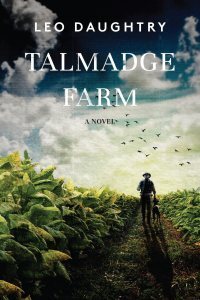 In a sweeping story set in eastern North Carolina, Leo Daughtry takes readers from 1957 to 1970, a time of convulsive societal change in Talmadge Farm (Story Merchant 2024). As the Vietnam War intensifies, the civil rights movement spreads across the South, reaching even wealthy bank president and tobacco farmer, Gordon Talmadge. North Carolina’s Research Triangle has its birth, accelerating the industrial development of farms and the decline of tobacco. Another blow to the tobacco industry comes from the Surgeon General, who warns of health risks and mandates warnings on cigarette packs.
In a sweeping story set in eastern North Carolina, Leo Daughtry takes readers from 1957 to 1970, a time of convulsive societal change in Talmadge Farm (Story Merchant 2024). As the Vietnam War intensifies, the civil rights movement spreads across the South, reaching even wealthy bank president and tobacco farmer, Gordon Talmadge. North Carolina’s Research Triangle has its birth, accelerating the industrial development of farms and the decline of tobacco. Another blow to the tobacco industry comes from the Surgeon General, who warns of health risks and mandates warnings on cigarette packs.
Buffeted by changes he resists, Gordon badly misplays his hand. Alternating between defiance and compliance, he treads a crooked path, using alcohol and denial to avoid the challenges he faces. While his wife Claire shows kindness to the farm’s two sharecroppers and their families, Gordon exhibits enough arrogance, disregard, and bigotry to earn readers’ distain.
With sensitivity and attention to detail, Daughtry tells the story of Gordon Talmadge, along with his family members. Interwoven are two other families, those of the sharecroppers who work the fields. Each family has its own demons and secrets. The sharecroppers live in poverty, toiling in ways that benefit the Talmadge family but not their own. One of the sharecroppers —the White one—bootlegs and drinks himself into trouble. The kindly Black sharecropper and his equally kind wife suffer from their inability to protect their three children from threats and influences beyond anyone’s control but that of Gordon and his near-clone of a son, Junior.
One of those sharecropper children, Jake, is forced to flee the farm:
He “squeezed himself into the bed of Mr. Allen’s truck. He was completely surrounded by baskets of summer crops: tomatoes, beans, okra, watermelon, peaches. He couldn’t help feeling as if he, too, had been plucked from the earth, uprooted from everything he’d ever known.”
The circumstance of Jake’s ultimate return is one of the poignant comeuppances of Gordon Talmadge, whose power and wealth turn out to be a house of cards. As Gordon struggles to keep from losing the farm, his bank flounders. In crisis, as he “pulled out of the employee lot, he noticed the workmen had finished installing the new bank sign. Waiting at the stop sign for traffic to clear, he watched them hurl the old lettering from Farmers and Merchants into the back of their truck, probably headed for the town dump.”
Gordon mellows into a character who is more insecure than imperious, and far more vulnerable than powerful. Forced to watch underlings succeed as he fails, Gordon emerges as the most transformed figure in this engaging saga.
Talmadge Farm serves as a timely cautionary tale about prejudice, greed, and resistance to change. It also serves as a reminder that human kindness can transform and resurrect lives going off the rails. It is a rebuke of privilege and a testament to Southern grit.

Leo Daughtry
Leo Daughtry is a first-time novelist who grew up in the tobacco fields of Sampson County, North Carolina. A graduate of Wake Forest University and its law school, he established a private practice and also served as a member of the North Carolina House and Senate for twenty-eight years. Still practicing law, Daughtry especially enjoys time at Atlantic Beach with his wife and daughters.
Share this:
March 21, 2025
Nicole Conn Chats with Dr. Mother Love!
Inspired by her mother, a classical-trained pianist who lived, recorded and worked in Morristown, NJ and Randolph, NY, LA filmmaker and author Nicole Conn decided to turn her attention from the big screen to pen Descending Thirds,

AVAILABLE ON AMAZON
In the high-stakes world of classical music, Alexandra von Triessen, a gifted but insecure pianist, navigates the cutthroat International Ketterling Piano Competition. Dazzled by the charming Sebastian D'Antonio, she finds herself drawn into a web of intrigue surrounding his enigmatic and estranged brother, Conrad. Just as Alexandra's star begins to rise, a shocking discovery sends her world crashing down, exposing secrets and lies that threaten to destroy everything she's worked for.
Descending Thirds is a gripping story of ambition, betrayal, and the blurred lines between artistry and integrity. This page-turner explores the sacrifices we make in pursuit of our dreams and the devastating consequences of hidden truths. With two shocking twists that will leave you reeling, this unforgettable novel will resonate with anyone who has ever dared to reach for greatness.
March 20, 2025
The Great Midwest Book Festival Honor Nicole Conn's Novel Descending Thirds.
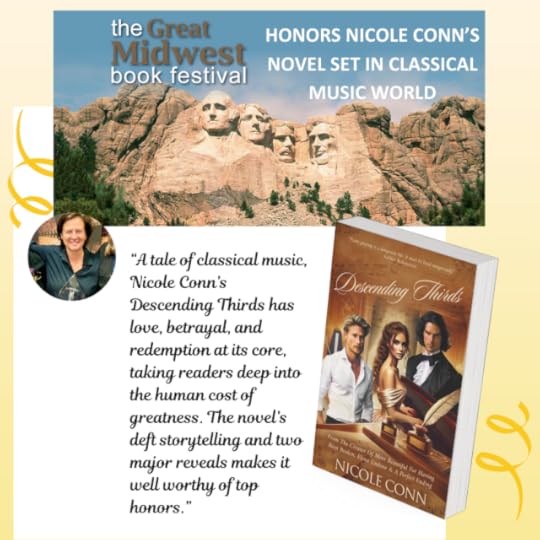
In the high-stakes world of classical music, Alexandra von Triessen, a gifted but insecure pianist, navigates the cutthroat International Ketterling Piano Competition. Dazzled by the charming Sebastian D'Antonio, she finds herself drawn into a web of intrigue surrounding his enigmatic and estranged brother, Conrad. Just as Alexandra's star begins to rise, a shocking discovery sends her world crashing down, exposing secrets and lies that threaten to destroy everything she's worked for.
Descending Thirds is a gripping story of ambition, betrayal, and the blurred lines between artistry and integrity. This page-turner explores the sacrifices we make in pursuit of our dreams and the devastating consequences of hidden truths. With two shocking twists that will leave you reeling, this unforgettable novel will resonate with anyone who has ever dared to reach for greatness.
March 19, 2025
Wake Forest Magazine Interviews Leo Daughtry
Double Deac Leo Daughtry draws on memories of his childhood tobacco farm to write a historical novel about the South.
Leo Daughtry (’62, JD ’65) drew inspiration and many of the characters for his historical novel “Talmadge Farm” from his years growing up on a tobacco farm in eastern North Carolina in the 1950s.
Daughtry, 84, grew up in rural Sampson County, about an hour southeast of Raleigh, on a farm owned by his father. He weaves a story of the wealthy Talmadge family and two sharecropper families — one white, one Black — whose lives intertwine against the backdrop of socioeconomic and racial changes sweeping the South that upend their lives in different ways. He draws from boyhood memories of dove hunting, moonshiners, segregation, the backbreaking work of harvesting tobacco and sharecroppers scraping to survive at a time when tobacco was king in North Carolina.
One reviewer described “Talmadge Farm” as a “stirring novel” with a “big, complicated portrait of family, place, race, class and greed.” The novel won first place in historical fiction in the 2025 Feathered Quill Book Awards and was named a finalist for the 2024 Goethe Book Awards for late historical fiction.
Daughtry and his wife, Helen, live in Smithfield, North Carolina. His granddaughters, Katherine Riley (’20) and Hannah Riley (’24), are also alumni.
Daughtry was a Judge Advocate General in the U.S. Air Force before founding law firm Daughtry, Woodard, Lawrence & Starling in Smithfield in 1969. He served in the North Carolina House and Senate for 28 years, and was House majority and minority leader, until retiring in 2017. A past member of the Alumni Council and School of Law Board of Visitors, he has endowed scholarships in the college and law school. The law school named its in his honor in 2018. The North Carolina Bar Association established the N. Leo Daughtry Justice Fund in 2022.
Kerry M. King (’85) of Wake Forest Magazine talked with Daughtry by Zoom at his office in Smithfield. Excerpts from their conversation have been edited for length and clarity.
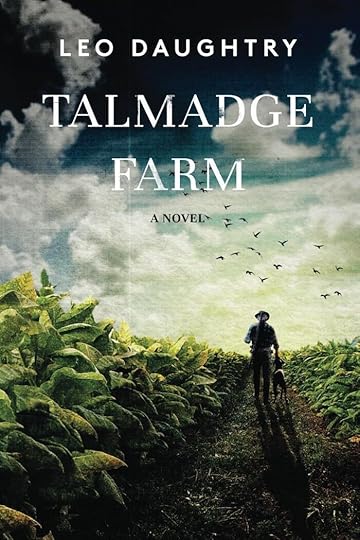
Kerry King: Before we talk about “Talmadge Farm,” I’m curious to know why you came to Wake Forest and what it was like when you were a student.
Leo Daughtry: My brother-in-law (Bill Peak ’48, MD ’51) went to Wake Forest, and I followed Wake Forest sports — Dickie Hemric (’55) and players like that. There was a tournament called the Dixie Classic (held in Raleigh from 1949 to 1960) where the Big Four (Wake Forest, Duke, NC State and UNC-Chapel Hill) would play four other schools, and we would go to at least one game to see Wake Forest play.
Wake Forest had recently moved to Winston. Dr. (Harold) Tribble (LL.D. ’48, P ’55) was president. We had chapel on Tuesdays and Thursdays. There was no dancing on campus. If we had parties, we’d have them off campus. For football games, we all wore suits. If you were lucky enough to have a date, you always got her a mum or flower to wear.
Wake Forest was great for me. It allowed me to leave the tobacco farm and go to college and experience life in a different way than I had known before. And Wake Forest was very patient with me. I tried to be a good student, but I just didn’t have the background. It took me a while to get my bearings.
The Vietnam War was really becoming an issue. I went into the Air Force (after graduating from law school) and served in Turkey, assigned to NATO.
KK: Do you remember any particular professors, either in college or in law school?
LD: Dr. (John) Broderick in English, Dr. (Emmett Willard) Hamrick (P ’83) in religion, Dr. (David) Smiley (P ’74) in history and Dr. (Kenneth) Raynor (1914) in math. Dr. (Marcel) Delgado got me through Spanish. I didn’t have Dr. (Ed) Wilson (’43, P ’91, ’93) for a class, but I certainly knew and liked him. He was one of the finest guys and represented Wake Forest so well. I’ve gotten to know his son (Ed Wilson Jr. JD ’93), who is a judge.
In law school, Dr. (James) Webster (’49, JD ’51, P ’81), Dr. (Hugh) Divine, Dr. (Robert) Lee (JD 1928, P ’55, ’68), Dr. (Norman) Wiggins (’50, JD ’52). They were all good teachers.
KK: You had a long career as a lawyer and in the General Assembly. What inspired you to write “Talmadge Farm”?
LD: It had been germinating a long time. I wrote it from an outline I did when I was in the General Assembly. We’d have some debates that I didn’t have to be involved in, so I had some free time. I knew the characters I wanted in the book. The reason I chose the name Talmadge is because I didn’t know anybody named Talmadge so I could make him the bad guy. (Gordon Talmadge, a banker and the owner of Talmadge farm, is the book’s central character.) I would write the outline and then change it, and then write it and change it. I knew where I wanted to start and where I wanted to end.
Leo Daughtry ('62, JD '65), author of "Talmadge Farm"
KK: What were the major themes you wanted to write about?
LD: Well, sharecropping for one thing, and the 1950s. My most impressionable years were the late ’50s and early ’60s because I was a teenager. I saw all the changes that were beginning to occur in the South. I went to a very small country school, where half of the students at least were children of sharecroppers. I had Black sharecropper friends and white sharecropper friends. They had one thing in common. They were poor as church mice, and they had very little hope of getting ahead. Most of the kids that I knew wanted to get off the farm. Farms had gotten bigger, tobacco allotments had changed, and migrant workers were replacing the sharecroppers. And automation enabled farmers to be more efficient, and that just eliminated the sharecroppers.
(I also wanted to write) about change, how people have to change, and some people can change better than others. Gordon could not figure out how to change. He got left behind because of his inability to accept change.
KK: How much of the book draws from your experiences and people you knew growing up?
LD: Almost all of it. Gordon was invented; I had to have a villain. Everybody knows someone like Gordon. He had everything going for him, but he wasn’t very smart (and wouldn’t adapt to the changing South). Black people lived in a completely segregated environment then. I wanted to make all the women really strong (characters) because there were no women doctors or lawyers then.
KK: Alumni are sure to enjoy the tidbits you sprinkle in the book about Wake Forest, Winston-Salem, Old Salem and R.J. Reynolds. The book ends soon after one of the characters, David, graduates from Wake Forest. Was he based on you?
LD: No, but I really wanted David (the good son in the novel) to go to Wake Forest. I didn’t want the bad son (to go to Wake Forest). (One of the other characters) went to Bowman Gray (School of Medicine). And, I remember Christmas at Old Salem and those Moravian cookies.
March 18, 2025
NEW FROM STORY MERCHANT BOOKS

AVAILABLE ON AMAZON
In the high-stakes world of classical music, Alexandra von Triessen, a gifted but insecure pianist, navigates the cutthroat International Ketterling Piano Competition. Dazzled by the charming Sebastian D'Antonio, she finds herself drawn into a web of intrigue surrounding his enigmatic and estranged brother, Conrad. Just as Alexandra's star begins to rise, a shocking discovery sends her world crashing down, exposing secrets and lies that threaten to destroy everything she's worked for.
Descending Thirds is a gripping story of ambition, betrayal, and the blurred lines between artistry and integrity. This page-turner explores the sacrifices we make in pursuit of our dreams and the devastating consequences of hidden truths. With two shocking twists that will leave you reeling, this unforgettable novel will resonate with anyone who has ever dared to reach for greatness.
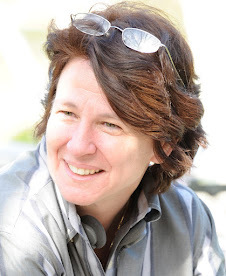 Renowned for her romantic lesbian-themed films, Conn's work includes the groundbreaking Claire of the Moon (1992), Elena Undone (2010), and "A Perfect Ending" (2012). She also earned critical acclaim for the award-winning documentary Little Man (2005) and the heartfelt drama More Beautiful for Having Been Broken (Nesting Doll) (2019).Now, Conn brings her signature storytelling talent to the world of mainstream romance with Descending Thirds—a novel that transcends labels. Whether you're a longtime fan or new to her work, this story is for everyone to experience. Rich in drama, Descending Thirds also immerses readers in the competitive world of classical music and features original musical compositions.
Renowned for her romantic lesbian-themed films, Conn's work includes the groundbreaking Claire of the Moon (1992), Elena Undone (2010), and "A Perfect Ending" (2012). She also earned critical acclaim for the award-winning documentary Little Man (2005) and the heartfelt drama More Beautiful for Having Been Broken (Nesting Doll) (2019).Now, Conn brings her signature storytelling talent to the world of mainstream romance with Descending Thirds—a novel that transcends labels. Whether you're a longtime fan or new to her work, this story is for everyone to experience. Rich in drama, Descending Thirds also immerses readers in the competitive world of classical music and features original musical compositions.
March 17, 2025
Story Merchant E-Book Deal Richard Pena's Last Plane Out of Saigon! FREE March 17 - March 21!
Richard Pena’s compelling first-hand account, written in real-time, chronicles the last desperate year of this tragic war and the hasty departure of American troops from Vietnam.

AVAILABLE ON AMAZON
LAST PLANE OUT OF SAIGON is a faithful reproduction of the journal of a draftee working in the operating room of Vietnam's largest military hospital during the final year of the war. Supporting historical and political context is provided by award-winning scholar, John Hagan.
Richard Pena’s entries were written in real time and, as they chronicle the last desperate year of this tragic war, present readers with a better understanding of the complicated final year of the Vietnam War from the inside, looking out. A year that tragically remains unfamiliar to most Americans.
This landmark book describes, in part, the hasty departure of American troops from Vietnam but is timely now as America again is challenged with multiple global conflicts. It is a gripping real-time account of the anger, resistance and resilience forged in one man by the horrors of Vietnam witnessed up close, in graphically human terms, touching on mistakes that were made then and which our country continues to make today. All Americans should read this important piece of history, bound to leave them with chills.
Richard Pena served in Vietnam as an Operating Room Specialist for the United States Army and left on the last day of American withdrawal. He is now a nationally renowned practicing attorney in Austin, Texas. He is a former President of the American Bar Foundation and State Bar of Texas and served on the Board of Governors of the American Bar Association.
John Hagan is the John D. MacArthur Professor of Sociology and Law at Northwestern University and Co-Director of the Center of Law & Globalization at the American Bar Foundation in Chicago. He has published nine books and more than 150 articles in nationally renowned magazines and journals.
March 14, 2025
New From Story Merchant Books Far From Longing by James Sard
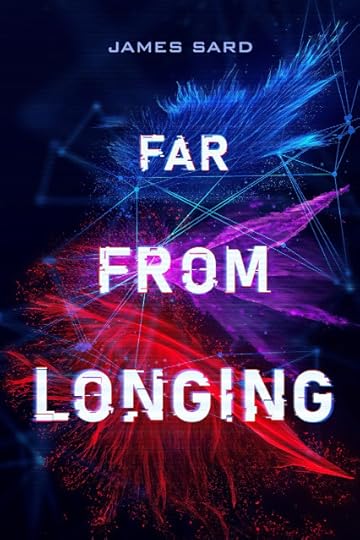
AVAILABLE ON AMAZON
When two pharmaceutical reporters meet, he is overwhelmed by the impact of her presence. Appropriate to a fault, she is nevertheless unnaturally drawn to him. Neither could have imagined the fallout of that first encounter.
As their orbits close, they are plunged into a maelstrom of physical and emotional carnage. These paths cannot be random, yet they are unable to fathom the staggering evolutionary forces ensnaring them – or the tragic consequences that await.
Pulled deeper into a lethal game of industrial intrigue and swept up by the events driving the conspiracy, they must unlock its purpose while trying to decode whether anything they’ve felt is even real.
Set against the latest advancements in genetic engineering and the high-takes world of over-funded pharmaceutical interests, Far From Longing takes readers on a thrilling reset of literary mythologies, delving into the true costs of scientific breakthrough and the nature of love itself.
March 12, 2025
Stealing Time for Your Dream in 2025 – Part 3: Work-management doesn’t work

Work-management doesn't work
Time and work (action) are, in one essential regard,opposites. Here are the laws of time-work physics:
1) Time is finite. We only live so long and, while we’realive, we’re allotted only 24 hours in every day.
2) Work—or action--is infinite. Work, whether good or bad,always generates more work, expanding to fill the time available.
Given these physical laws, it should be obvious that actionis unmanageable; that only time can be managed. Yet people regularly sabotagethemselves by trying to manage action. "First I’ll catch up with my dayjob, then I’ll take time for my dream," or, "First, I’ll get myfamily in good shape, then I’ll find time for dreams."
Don’t get me wrong. Action is what we’re trying to find timefor. Writers write. Craftsmen make tables or boats or flower arrangements.Actors and models go for auditions and interviews. Salespeople make salescalls--the more calls they make, the more sales. Dreamers take treks to exoticplaces. Shakespeare's observation, that "action is eloquence," is notonly creatively productive; it’s the best way to stay sane. Even one phone calla day in the service of your dreams, means, if you take two days off each week,200 calls per year. That’s definitely progress toward the mountaintop. Successcomes inevitably on the heels of constant action, as the ancient Greek poetHesiod pointed out in his almanac: "If you put a little upon a little,soon it will become a lot."
My mentor Tom Bergin (Sterling Professor of RomanceLanguages and Master of Timothy Dwight College at Yale) was the author offifty-nine books by the time he retired and eighty-three by the time he died.Yet he described himself as a "plodder." He just kept plodding away,in the vein of Hesiod. Tom and I exchanged hundreds of letters from the time Ileft Yale to the time he died. He taught me the relentless equation betweenconsistent, minor actions and ultimate productivity. One day, by way ofcomplaining about having no time to do any serious work because of all thetrivial errands and duties he had to attend to, he sent me a quotation fromEmerson: "Things are in the saddle and ride mankind."
Against the accelerating incoming bombardment of the thingsof contemporary life, action happens only when we steal time to make it happen.Yet schedules, to-do lists, self-revising agendas are constantly being testedand found insufficient. They work for a while, then become ineffective. Withoutrecognizing this reality, through the Mind’s Eye’s awareness, each time thishappens it may send us into a tailspin that moves us further from success. Lifedelights in creeping in to sabotage our dreams if only to make sure we’reserious about them. One of my clients, after six months of working together to changeher habits to become more productive, told me I was the "Ulysses S. Grantof time management." She told me that Grant wired Lincoln: "I plan tohammer it out on this line if it takes all summer"--and that his telegramwas read along the way before it was handed to the beleaguered President. Thejealous snoops told Lincoln, "You know, we have reports that General Grantdrinks a considerable amount of whiskey." "Is that right?"Lincoln replied. "Find out what brand he drinks and send a case of it toeach of my Generals."
The human nature of time
Archimedes: Give me a lever and I can move the world.
Atchity: Time is the Dreamer’s lever.
All you need to make your dreams come true is time. Usingtime as your most faithful collaborator begins with understanding itsinteractive characteristics and protean shapes. You’ll begin noticing that timebehaves differently under different circumstances. When you’re concentrating,your awareness of time seems to disappear because you’ve taken yourself out ofthe Accountant’s time and are dealing with the Visionary whose experience istimeless. When you're away from your quest, you become very conscious of timebecause your Visionary is clamoring in his cage to be released from theconstraints of logical time.
"You've got my full attention": compartments oftime, time and energy, rotation, kinds of time, and linkage
Time-effectiveness is a direct function of attention span.When you’re concentrating, giving the activity you’re involved with your fullattention, you produce excellent results. When your attention span wavers andfades, the results diminish. Until you recognize that attention span dictateseffectiveness, you’re likely to waste a great deal of time.
The key to avoiding this situation is assessing how longyour attention span is for each activity you engage in--and then doing yourbest to engage in that activity in appropriate compartments (allotments of timethat you’ve found to be most productive). Since my particular career ismultivalent, I pursue what I call a "rotation method” of moving amongactivities that support my producing, managing, writing, brand-launching,speaking, and managing my next quest. Ilove all these activities, but not when I do them exclusively--each one havingits own high ratio of crazy-making aspects that diminishes automatically whenthat activity is juxtaposed with the others.
Except during a crisis in one of the four areas, at whichpoint all other activities stand aside until the crisis is resolved, I find itstimulating to spend an hour working on production-related matters, thenspending the next hour on calls that manage various client projects indevelopment. I’ve also learned that it’s a waste of time to try to controlthings that only time can accomplish--such as making a phone call, then waitingnext to the phone for a response to it; or staring at the toaster waiting forthe toast to pop up. The only time you have anything approaching direct controlof anything is when the ball is in your court. During that moment I focus ongetting the ball out of my court into someone else’s court so that I’ve done whatI need to do to make the game continue. Success is all about what you do whileyou’re waiting.
Rotating from one activity to another ensures that theoutreach begun in Activity A will be "taking its time" while you’reengaged in Activities B, C, and D. When the phone rings from the A call, youinterrupt D to deal with it--and it’s generally a pleasant interruption,knowing that one facet of your career is vying with another for your attention.
An hour is probably an average attention span compartment forwork. But the length of the particular compartments (remember that"compartments" are allotments of time given to a particular workactivity) changes from time to time as your attention span for that activityevolves. During the original drafting of this book, for example, I spent twohours a day writing, whereas before I began the draft my attention span allowedme to spend only an hour or less a day thinking about the book and gathering mynotes for it.
There’s no magical formula for determining attention span;it changes as you and your circumstances change. Yet once determined, attentionspan is the mastering rod between the serpents, the compartment of time wherepast and future meet in a present that feeds from the first and nourishes thelatter.
Obviously attention span is related to your energy level atdifferent times of day, and with regard to different activities. Activitiesthat drain you should not be scheduled one after the other, but shouldalternate with activities that create energy for you.
Energy and attention span will also be different dependingon whether you’re at the beginning, in the middle, or at the end of aparticular objective. Your attention span is most in danger of sabotaging youin the middle, where it’s easy to confuse your fatigue from the hard work ofplodding forward with some sort of psychological upset caused by the processyou’re engaged in. Usually that situation can be resolved by shortening theallotments of time you’re devoting to the present objective; or changing theactivities around which you’re scheduling this objective’s compartments.
When a particular compartment is nearing its end, use thelast few minutes of it (when the Accountant comes back online to remind youthat the time is "almost up") to jot down what you’re going to do thenext time you revisit this compartment. This automatically puts your Visionaryand Accountant into a percolation mode in which they bat things back and forth"in the back of your mind" while you¹re busy working in the next activity’scompartment.
Next: Where does the time go?

